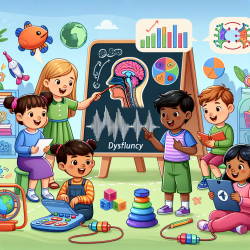Introduction
As practitioners in the field of speech-language pathology, our primary goal is to foster positive outcomes for children through evidence-based practices. The research article "How the Senior Community Service Employment Program Influences Participant Well-Being: A Participatory Research Approach With Program Recommendations" offers insights that can be adapted to enhance our therapeutic practices, particularly in online settings like those provided by TinyEYE.
Understanding the Research
The study explores the Senior Community Service Employment Program (SCSEP), which provides job training for older adults, and examines its impact on participants' financial, physical, and mental well-being. The participatory research approach used in the study highlights the importance of understanding the complex interactions between individual, organizational, and policy factors.
Key Findings and Their Implications
- Reducing Social Isolation: SCSEP participation was found to decrease social isolation, a factor that can significantly enhance the desire to engage and improve well-being. In our practice, creating opportunities for children to interact socially, even in virtual environments, can foster a sense of belonging and motivation.
- Holistic Success Benchmarks: The study suggests that success should be measured not only by employment outcomes but also by health and well-being metrics. For children, this means assessing progress not just in speech and language skills but also in overall confidence and social engagement.
- Community-Based Approaches: The use of community-based system dynamics in the research highlights the value of involving stakeholders in the process. Engaging parents, teachers, and children in therapy planning can lead to more tailored and effective interventions.
Implementing Research Insights in Practice
To apply these findings, practitioners should consider the following strategies:
- Enhance Social Interaction: Incorporate group activities in therapy sessions that encourage peer interaction and collaboration.
- Broaden Success Metrics: Develop comprehensive assessment tools that evaluate not only speech and language improvements but also emotional and social growth.
- Foster Community Involvement: Create feedback loops with parents and educators to continuously refine therapy goals and methods.
Encouraging Further Research
Practitioners are encouraged to delve deeper into participatory research methods to understand the broader impacts of their interventions. This approach not only enhances the quality of therapy but also empowers stakeholders to contribute to the child's development journey.
Conclusion
By integrating insights from the SCSEP study, speech-language pathologists can enhance their practice, leading to improved outcomes for children. Embracing a holistic, community-focused approach ensures that therapy is not only effective but also enriching for all involved.
To read the original research paper, please follow this link: How the Senior Community Service Employment Program Influences Participant Well-Being: A Participatory Research Approach With Program Recommendations.










